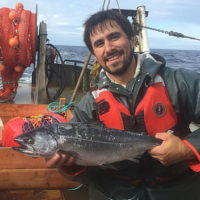Northland College, B.Sc. Natural Resource Management, Fisheries Ecology & Management emphasis, Minor: GIS; Biology
I grew up on the shores of Lake Superior in Washburn, Wisconsin. My father is a retired Fisheries Biologist with the United States Fish & Wildlife Service (USFWS) where he served 34 years. I watched my father progress throughout his career and always thought he had the most unique job in the world. My passion for fisheries work began at an early age where I assisted my father on late night electro-fishing surveys in Chequamegon Bay and was exposed to both commercial fisheries in the Great Lakes and native ceded territorial fisheries. I graduated from Northland College, just across the bay from where I grew up with a Bachelor’s in Natural Resource in Fisheries Ecology and Management and minored in both Geographical Information Systems and Biology. During my senior year, I used a dataset from the Arctic Long Term Ecological Research station located in Toolik, Alaska, to study the effect of fertilizer enrichment to streams and how added nutrients affected the growth of juvenile Arctic grayling.
During my time in college, I worked seasonally for the USFWS at the Ashland Fisheries Resource Office where I gained experience working with 3 Fisheries Biologists who led their own projects. I learned how to gillnet lake-whitefish and lake trout to later age otoliths to learn age structure, operate passive integrated transponder tags to monitor the distribution of newly re-introduced coaster brook trout, and monitored invasive species in the St. Louis estuary near Duluth, Minnesota, where large trans-Atlantic ships were found to be transporting non-native fishes to the Great Lakes.
After graduating, I moved to Alaska with my wife in pursuit of all the great opportunities Alaska has for a young aspiring fisheries biologist. I worked for several seasons on various projects throughout the state and began to gain some sense as to how important Alaskan fisheries are to the people and ecosystems that they support.
I am currently working with the USFWS here in Anchorage in the Office of Subsistence Management – Division of Fisheries. My role here is to gain experience with complex natural resource issues that rural subsistence users face. I am a lead analyst on fisheries regulatory proposals where I work closely with Regional Advisory Councils, Federal land managers, biologists, and the Federal Subsistence Board to determine if new regulations for subsistence fisheries should be added or modified. I also help with the Fisheries Resource Monitoring Program where the Office of Subsistence Management supports ongoing research in the state to address subsistence fisheries research that is needed to better inform management decisions. I also assist with the Partners for Fisheries Resource Management where we work closely with native agencies and associations to fund projects that address both social science and fisheries research within their surrounding communities. Lastly, I work closely with the Alaska Native Science and Engineering Program to recruit seasonal fisheries interns that provides opportunities for young adults to work alongside fisheries biologist and gain experience working in the field.
The research I am working on at Alaska’s Pacific University’s FAST lab is titled, “Assessment of the Eastern Bering Sea juvenile Chinook Salmon and the role of diet on both growth and condition”. This research is funded by the Alaska At-Sea-Processors Association and is partnered with the Alaska Department of Fish and Game and the National Oceanic and Atmospheric Administration. Juvenile Chinook Salmon were sampled using a surface water trawl in the Eastern Bering Sea during 2015 and 2016. This study

